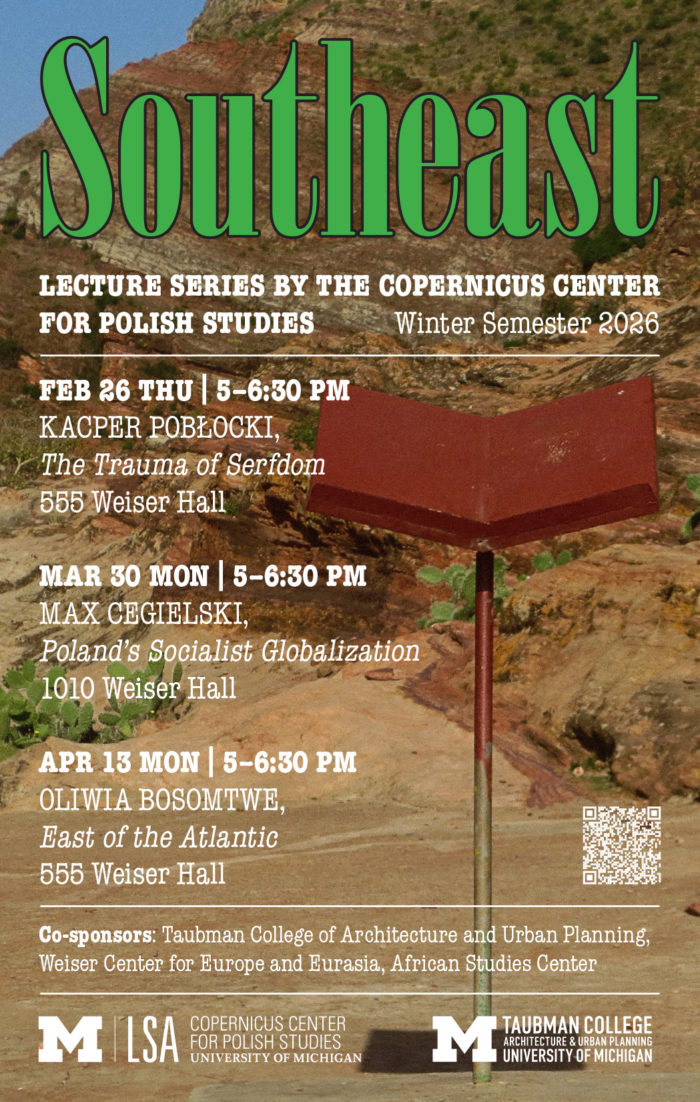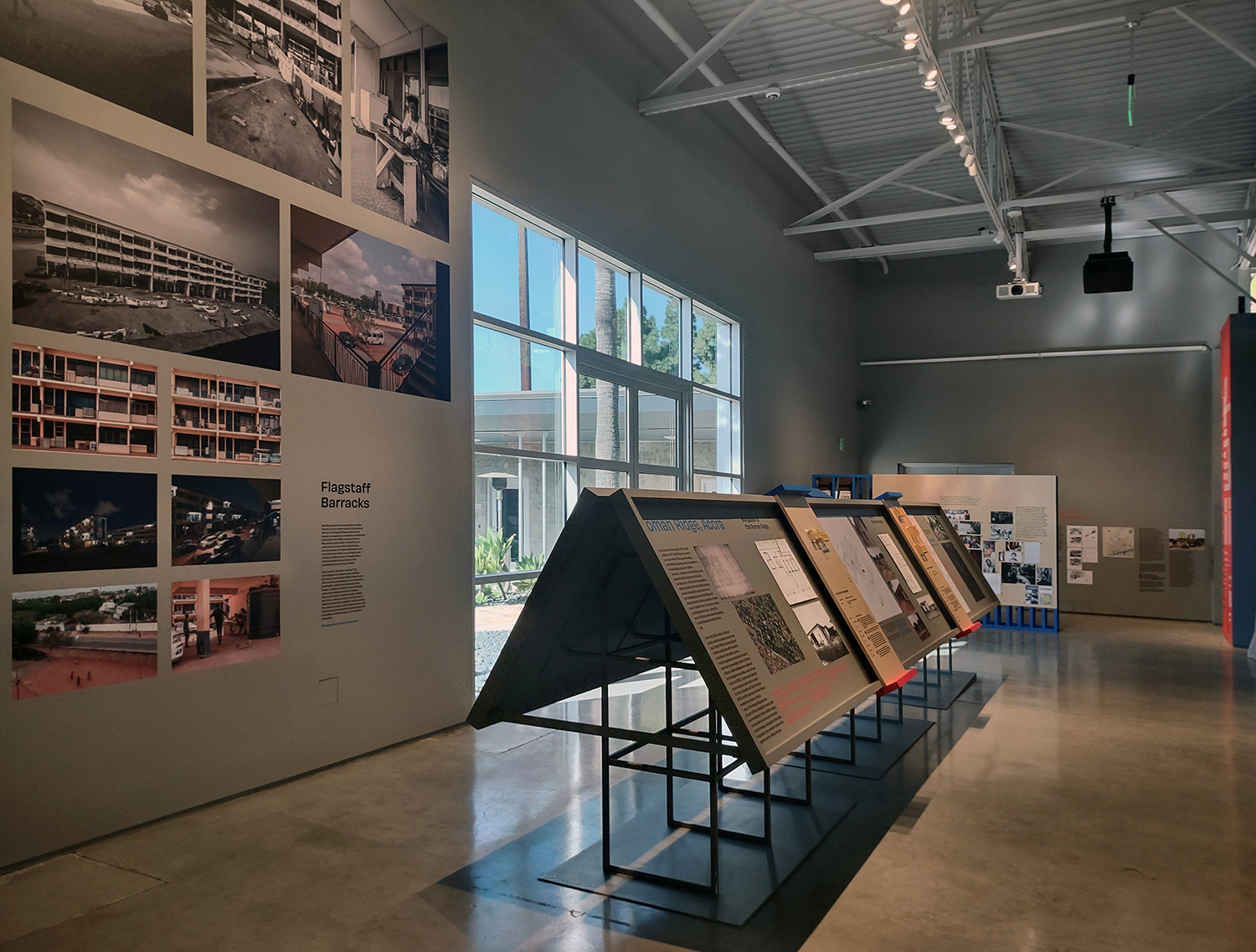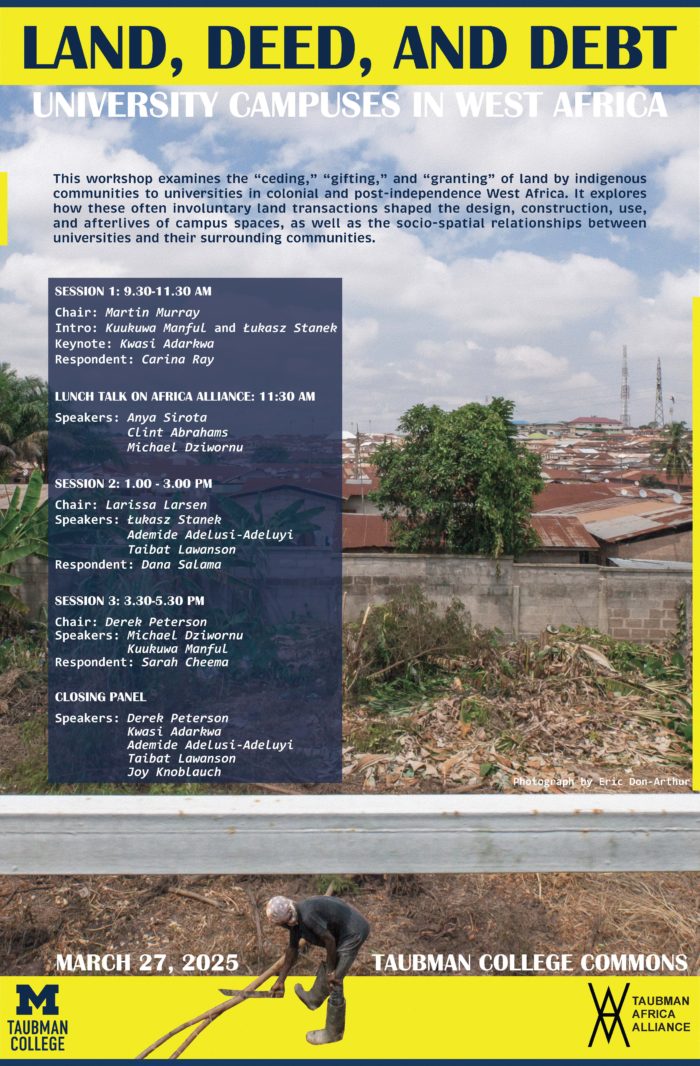Southeast Lecture Series

In the winter semester of 2026, in my role as Acting Director of the Copernicus Center for Polish Studies at the University of Michigan, I am convening the lecture series Southeast, which examines Poland’s encounters with Africa and Asia during the twentieth century and their lasting consequences. Speakers include the social scientist Kacper Pobłocki, who will discuss Poland’s ambiguous position in the history of European colonialism; the journalist, writer, and curator Max Cegielski, who will explore Poland’s “socialist globalization;” and the Polish-Ghanaian author Oliwia Bosomtwe, who explores the stories of Poles of African descent.
December 7, 2025
Intersections Exhibition Opens in Los Angeles

The exhibition Intersections: The Architecture of Victor Adegbite and Charles Polónyi in Ghana was opened at The Wende Museum in Los Angeles. Curated by Office Southeast in collaboration with Dana Salama, Intersections explores how architecture shaped the ambitions of newly independent Ghana during the 1960s. The exhibition centers on two encounters. The first was the collaboration between Ghanaian architect Victor Adegbite and Hungarian architect Charles Polónyi who, in the wake of Ghana’s independence (1957), designed housing schemes that responded to Ghana’s needs, means, and aspirations. Archival documents, analytical drawings, and contemporary photographs by Ghanaian photographer Eric Don-Arthur show how Adegbite’s and Polónyi’s buildings continue to structure life in Accra today. The second encounter takes place in the exhibition space between two archives, preserved by the architects’ daughters in the United States and Hungary. They reveal how the history of modern architecture is made possible by personal acts of memory and care.
November 8, 2025
Introducing Office Southeast

Building upon several years of collaboration, Michael Gameli Dziwornu and I have launched Office Southeast, an urban research collaborative based in Accra, Ghana. The name reflects our respective trajectories, but also our approach to seek methods and concepts outside hegemonic centers of knowledge production.
October 20, 2025
New Essay: Women Architects from Eastern Europe in Africa during the Global Cold War

I have contributed to the monumental Bloomsbury Global Encyclopedia of Women in Architecture 1960-2020, edited by Lori A. Brown and Karen Burns, with Hannah Le Roux as the editor for Africa section. This entry explores the significant, yet often overlooked, contributions of Eastern European women architects in newly independent African countries and shows how their conditions of labor were shaped by gender expectations, Cold War politics, racial imaginaries, and competing visions of decolonization.
August 26, 2025
Graham Foundation Grant: The Gift. Spaces of Global Socialism and Their Afterlives

I am grateful to the Graham Foundation for Advanced Studies in the Fine Arts for supporting our book The Gift: Spaces of Global Socialism and Their Afterlives. The project expands on several initiatives from recent years, notably The British Academy conference in Manchester (2022) and the exhibition at the Architekturmuseum der TUM in Munich (2024). The book’s greatest strength lies in its contributors, who broaden the range of voices in architectural scholarship and explore new forms of collaborative work: Fantahun Ayele, Daria Azbayar, Boris Chukhovich, Yanjinlkham Dashtseren, Kojo Derban, Korkor Ebeheakey, Claudia Gastrow, Suha Hasan, Ana Ivanovska, Damjan Kokanevski, Vladimir Kulic, Ksenia Litvinenko, Ye Liu, Kulshat Medeuova, Monika Motylińska, Thuc Linh Nguyen Vu, Kwasi Ohene-Ayeh, Uurtsaikh Sangi, Christina Schwenkel, Ke Song, Alevtina Solovyova, Setiadi Sopandii, Paul Sprute, Miruna Stroe, and GerHub.
August 7, 2025
New essay: Global Trajectories of Polish Architects in the Cold War
In: Anti-Atlas. Critical Area Studies from the East of the West, edited by Tim Beasley-Murray, Wendy Bracewell, and Michał Murawski (London: UCL Press, 2025), 301-7

My contribution to the Anti-Atlas is an annotated diagram mapping the trajectories of 417 architects and planners from socialist Poland who worked in Africa and the Middle East during the Cold War. Focusing on the top 12 recipient countries in terms of project volume, this diagram is based on information from professional dossiers submitted to the SARP (Society of Polish Architects) in Warsaw. Data from these individual dossiers was transcribed and analyzed using social network analysis software. More than just a representation of existing knowledge, the resulting diagram becomes a generator of new insights. For example, it identifies the largest recipient countries of architectural labor from the People’s Republic of Poland (Libya, Algeria, Syria, and Iraq), illustrates patterns and volumes of mobility of Polish architects, and highlights individuals with unique career trajectories, which can be further explored by examining their dossiers. By consolidating individual trajectories into a single, comprehensive map, it presents a geography of architectural exchanges from the 1950s to the 1980s that goes beyond Cold War narratives of a world divided into two blocs. In so doing it offers a more multilateral and antagonistic understanding of global urbanization and its architecture.
February 28, 2025
Workshop: Land, Deed, and Debt: University Campuses in West Africa
Workshop on March 27, 2025 at Taubman College of Architecture and Urban Planning, University of Michigan, Ann Arbor, organized by Kuukuwa Manful and Łukasz Stanek

The Land, Deed, and Debt workshop examines the consequences of the “ceding,” “gifting,” and “granting” of land by Indigenous communities for the establishment and expansion of higher education institutions in colonial and post-independence West Africa. Participants study how these often-forced land transfers have shaped the design, construction, and use of space on and around campuses, as well as the socio-spatial relationships between communities and universities. Organized by Łukasz Stanek and Kuukuwa Manful, the workshop fosters an international comparative perspective on the histories of land transferred by Indigenous peoples to educational institutions.
March 4, 2025
New paper: Hegemony by Adaptation. Decolonizing Ghana’s Construction Industry
Comparative Studies in Society and History (2024), 1-34

This paper discusses competing visions of the decolonization of Ghana’s economy during the first decade of the country’s independence from Britain (1957–1966), and the agency and horizon of choice available to the Ghanaian decision-makers in charge of implementing these visions. It focuses on Ghana’s construction industry, both as an important part of the national economy and as a condition for Ghana’s broader social and economic development in the context of colonial-era path-dependencies and Cold War competition. By taking the vantage point of mid-level administrators and professionals, the paper shows how they negotiated British and Soviet technological offers of construction materials, machinery, and design. In response to Soviet claims about the adaptability of their construction resources to Ghana’s local conditions, the practice of adaptation became for Ghanaian architects and administrators an opportunity to reflect on the needs, means, and objectives of Ghana’s construction industry, and on broader visions of Ghana’s economic and social development. Beyond the specific focus on the construction industry, this paper conceptualizes the centrality of adaptation in enforcing technological hegemony during the period of decolonization, and discusses African agency beyond the registers of extraction and resistance that have dominated scholarship on the global Cold War
October 8, 2024